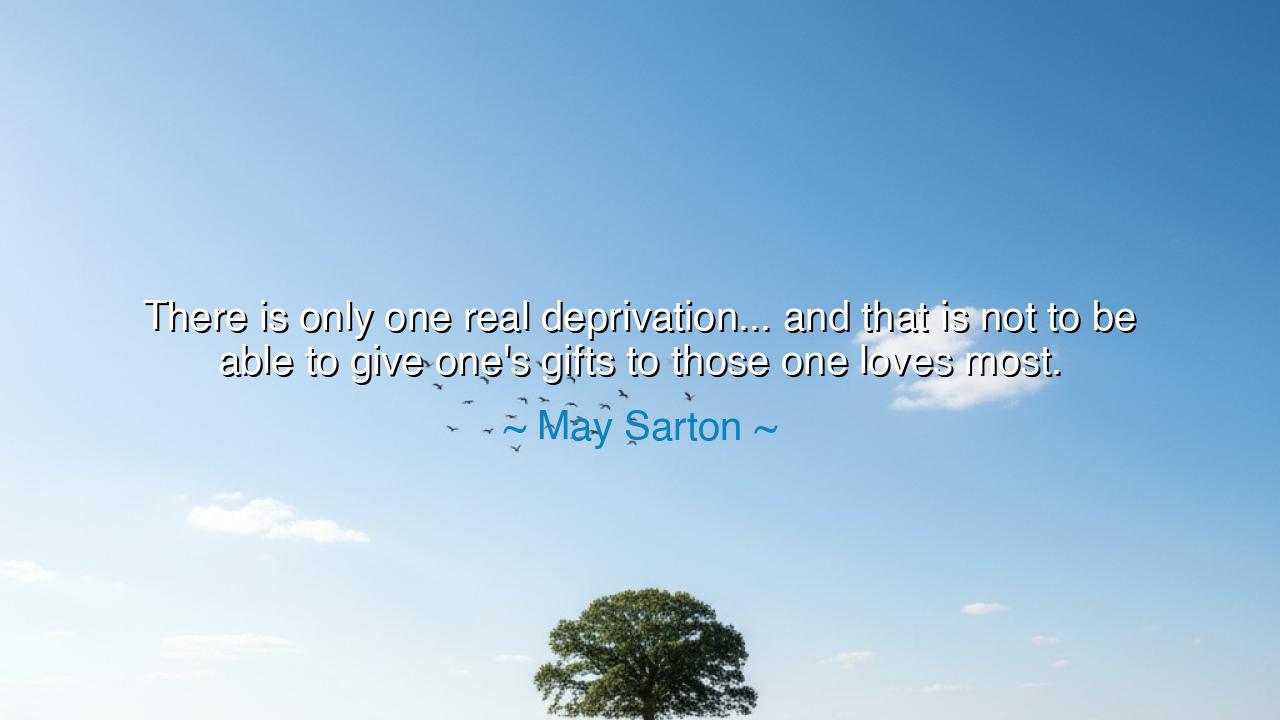
There is only one real deprivation... and that is not to be able
There is only one real deprivation... and that is not to be able to give one's gifts to those one loves most.






May Sarton, the poet of the heart and soul, speaks a truth that strikes at the very essence of what it means to give and to love: “There is only one real deprivation… and that is not to be able to give one's gifts to those one loves most.” In this simple yet profound declaration, she reveals that the greatest sorrow we can experience is not the loss of material wealth, not the absence of power or recognition, but the inability to offer our gifts, our deepest talents and affections, to those we hold most dear. To love is to want to give, and when the capacity to give is stripped away, a deep emptiness takes its place. This deprivation is a wound that cuts deeper than any loss of physical possession, for it is a loss of connection, a loss of the very essence of who we are.
In the ancient world, the wise ones often spoke of gifts as sacred offerings—manifestations of the soul’s deepest longings. Plato wrote of the philosopher’s gift to society, how wisdom and knowledge, when shared, uplift not just the mind, but the soul. The greatest gift one could give, according to the ancients, was the sharing of self—whether through wisdom, love, or art. The giving of one’s gifts was seen as a divine duty, a way to weave oneself into the fabric of the universe, contributing to the greater good. But Sarton’s words remind us that true deprivation is not found in material lack but in the inability to give the gifts that make us feel whole—gifts of love, compassion, creativity, and care.
The story of Vincent van Gogh offers a poignant example of this very truth. Van Gogh, in his life, was a man of immense talent, yet he was plagued by an inability to share his gift in the way he longed to. His art, though deeply emotional and profound, was not appreciated during his lifetime. He painted not for fame or recognition but out of an intense desire to connect, to share his vision with the world, to give his soul to those who would see it. But much of his work went unrecognized, and his struggles with mental illness and isolation led him to feel that his gifts were, in many ways, wasted. The greatest deprivation of his life, as Sarton might say, was the inability to offer his gifts to those he loved most—the people who might have understood and appreciated the depth of his work.
Consider, too, the example of Mother Teresa, who devoted her life to serving the poor and the dying. Her love was a gift that she shared with the world, but even she experienced moments of longing to give more. She once said that she felt a deep emptiness when she was unable to do enough for those in need, even though she had devoted herself completely to their care. The deprivation she felt was not in lacking the resources to help, but in being unable to offer more—to give her gifts more fully to those she loved most. Her life teaches us that love is a giving force, and the true deprivation is not in the love itself, but in the limitations that prevent it from being expressed fully.
Sarton’s wisdom calls us to examine how we view our gifts—not as possessions to be kept, but as offerings to the world and to the ones we love. To give freely, without expectation of return, is the highest form of love. But when circumstances arise—whether through distance, illness, or conflict—that prevent us from giving, we feel an ache in our hearts, a hollowness that no material thing can fill. It is a reminder that our deepest desires are not rooted in possessions but in the connection we have with others, and the gifts we are able to share. Love, in its highest form, is the gift we give to one another, and to be unable to share it is a deprivation beyond measure.
In your own lives, children of the future, remember this truth: give your gifts freely, and do not withhold them out of fear or hesitation. Offer your love, your time, your wisdom, and your creativity to those around you. Do not wait for the perfect moment or the right conditions. Give without holding back, for in giving, you not only bless others but fill your own life with purpose and meaning. The gift of love is the greatest of all gifts, and to give it freely, without reservation, is the path to a fulfilled life.
Let us also remember that when circumstances prevent us from offering our gifts fully, it is not the end. We must continue to seek ways to give, to serve, and to connect. If you cannot give one gift in the way you wish, find another way to share your heart. Whether through kindness, art, conversation, or service, never allow your gifts to be silenced. The deprivation is not in the lack of the gift, but in the absence of the will to give. Keep your heart open and continue to offer what you can, for in doing so, you fulfill the greatest purpose of all.






AAdministratorAdministrator
Welcome, honored guests. Please leave a comment, we will respond soon